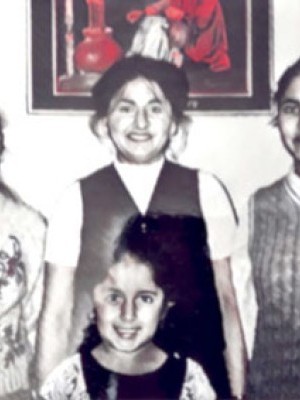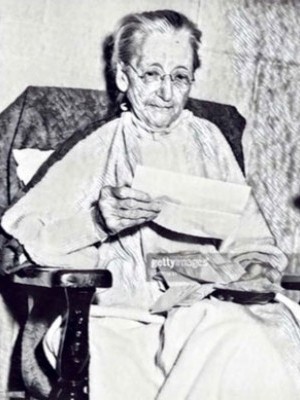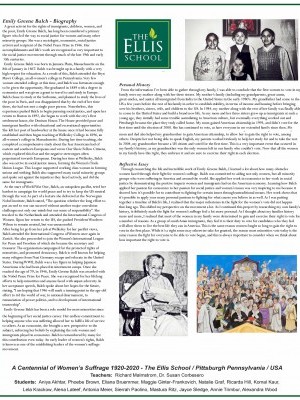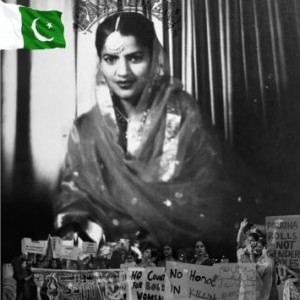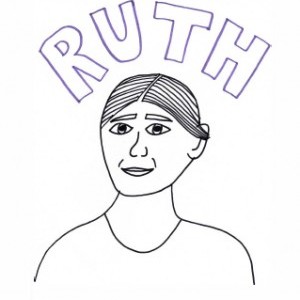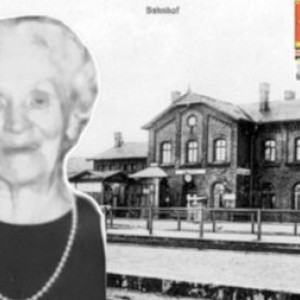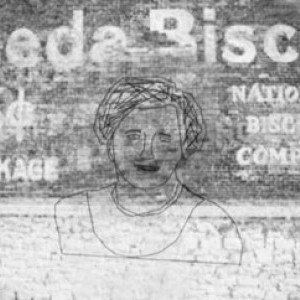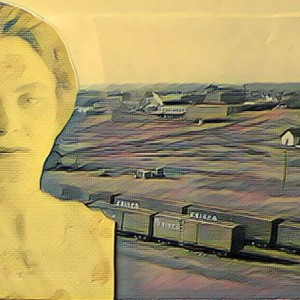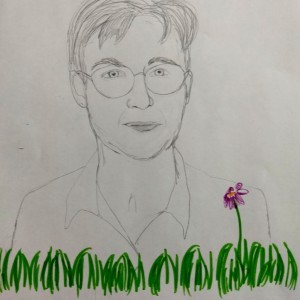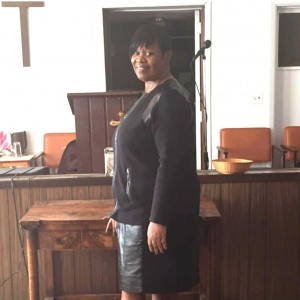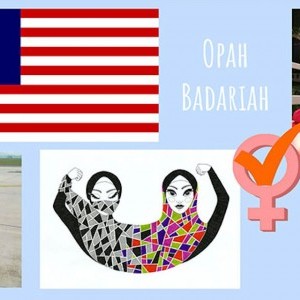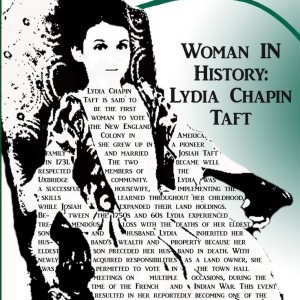Komal Preet Kaur
The Ellis School | Pittsburgh, PA | 11th Grade
Inspirational Family Member
The Women in my Family
From the information I’ve been able to gather through my family, I was able to conclude that the first women to vote in my family were my mother along with her three sisters. My mother’s family (including my grandparents, great-aunts, great-uncles, and aunts) all immigrated from India to the United States in the early 1980’s. My grandfather had come to the US a few years before the rest of his family in order to establish stability, in terms of income and housing before bringing over his brothers, sisters, wife, and children to the US.
In 1984, my mother along with the rest of her family was finally able to come to the United States and build a brand new life. As my mom and her three sisters grew up as immigrants at such a young age, they initially had some trouble assimilating to American culture, but eventually everything worked out and Pittsburgh became the place they truly called home. My mom gained American citizenship in 1993, and didn’t vote for the first time until the election of 2000. She has continued to vote, as have everyone in my extended family since then.
My mom and dad also helped my grandmother to gain American citizenship, to allow her to gain the right to vote, among others. Despite her not being able to speak English, my parents worked tirelessly to help her study for and to take the test. In 2004, my grandmother became a US citizen and voted for the first time. This is a very important event that occurred in my family’s history, as my grandmother was the only woman left in our family who couldn’t vote. Now that all the women in my family have this right, they embrace it and are sure to exercise their right in each election.
Historical Figure I Admire
Emily Greene Balch
A great activist for the rights of immigrants, children, women, and the poor, Emily Greene Balch, has long been considered a primary figure who led the way to social justice for women and many other minority groups. She was a sociologist, economist, social justice activist and recipient of the Nobel Peace Prize in 1946. Her accomplishments and life’s work are recognized as very important to the social justice movements through much of the late 19th and early 20th centuries.
Emily Greene Balch was born in Jamaica Plain, Massachusetts on the 8th of January in 1867. Balch was brought up in a family with a very high respect for education. As a result of this, Balch attended the Bryn Mawr College, an all-women’s college in Pennsylvania. Very few women attended college at this time, and Balch was fortunate enough to be given the opportunity. She graduated in 1889 with a degree in economics and was given a grant to travel to and study in Europe. Balch chose to study at the Sorbonne, and planned to study the lives of the poor in Paris, and was disappointed that by the end of her time there, she had not met a single poor person. Nonetheless, this experience pushed Balch to begin pursuing social justice, and upon her return to Boston in 1892, she began to work with the city’s first settlement house, the Denison House. The House provided poor and immigrant families with educational and recreational opportunities. She left her post of headworker at the house once it had become fully established and then began teaching at Wellesley College in 1896, an all-women’s college in Massachusetts. During her time teaching, she completed a comprehensive study about the fear Americans had of eastern and southern Europeans and wrote Our Slavic Fellow Citizens, which explored this fear and the negative stereotypes often perpetuated towards Europeans. During her time at Wellesley, Balch also was active in social justice issues, forming the Women’s Trade Union League. This League supported working class women in forming unions and striking. Balch also supported many racial minority groups and spoke out against the injustices they faced actively, and did the same for immigrants.
At the start of World War One, Balch, an outspoken pacifist, tried her hardest to campaign for world peace and to try to keep the US neutral through the war. As part of a lecture she delivered at the Norwegian Nobel Institute, Balch stated, “The question whether the long effort to put an end to war can succeed without another major convulsion challenges not only our minds but our sense of responsibility”. She traveled to the Netherlands and attended the International Congress of Women, and upon her return to the US, pushed President Woodrow Wilson to remain neutral, but was unsuccessful.
After being let go from her job at Wellesley for her pacifist views, Balch attended the International Congress of Women once again in Zurich. She also proceeded to join the Women’s International League for Peace and Freedom of which she became the secretary and treasurer. The organization campaigned for the protected rights of minorities, and promoted democracy. Balch is well known for helping many refugees from Nazi Germany escape and relocate in the United States. During WWII, Balch was a key figure in helping Japanese Americans who had been placed in internment camps. Once she reached the age of 79, in 1946, Emily Greene Balch was awarded with the Nobel Peace Prize for Peace. She was recognized for her lifelong efforts to help minorities and anyone faced with unjust adversity. In her acceptance speech, Balch spoke about her hopes for the future, stating, “I am hoping that 1946 will mark a turning point in the age-old effort to rid the world of war, for national disarmament, for the renunciation of power politics, and to development of international trusteeship”
Emily Greene Balch has been a role model for most minorities since the beginning of her social justice career. Her endless commitment to helping anyone who was suffering allowed her to fulfill a life of service to others. As an economist, she brought a new perspective to the subject, enforcing her beliefs by explaining the role women and immigrants played in economics. Balch is remembered by many for this contribution even today. An early leader of women’s rights, Balch is known as one of the establishing leaders of the women’s suffrage movement.
SOURCES +
What the Project Means to Me
Through researching the life and incredible work of Emily Greene Balch, I learned a lot about how many obstacles women faced through their fight for women’s suffrage. Batch was committed to aiding not only women, but all minority groups who were suffering in America and around the world. She applied her work in economics to her work in social justice by demonstrating the positive impacts women and immigrants had on the American economy. Learning how Balch applied her passion for economics to her passion for social justice and women’s issues was very inspiring to me because it showed how it’s possible to contribute to fighting for certain issues through untraditional means. Her work shows that it’s possible to apply your many personal passions to fighting for what causes you believe in as well. As I was putting together a timeline of Balch’s life, I realized that the major milestones in the fight for the women’s vote did not happen that long ago. This shifted my perspective on the movement a lot.
As I continued this project by researching my own family’s history, it definitely made the fight for women’s suffrage feel a lot more personal. As I thought about my family’s history more and more, I realized that most of the women in my family were determined to gain and exercise their right to vote for a number of reasons. As a group of South Asian immigrants, they feel it is their duty to vote for candidates who they feel will allow them to live the best life they can in America. This is the same reason women fought so long to gain the right to vote in the first place. While it’s a right some may otherwise take for granted, the reason most minorities vote today is the same reason the fight for everyone to be able to vote began, and this is always important to consider when we think about how important the right to vote is.
Explore the Archive
More From This Class
Click on the thumbnails below to view each student's work.Deadline Extended
There's still time to join Women Leading the Way.
Become a part of our storytelling archive. Enroll your class today.
Join the Project

